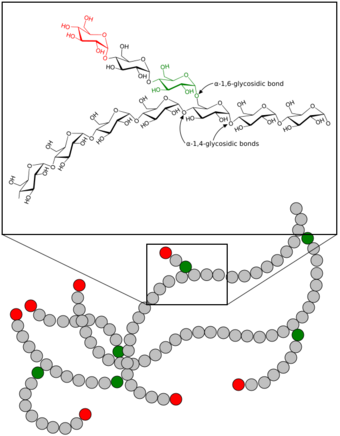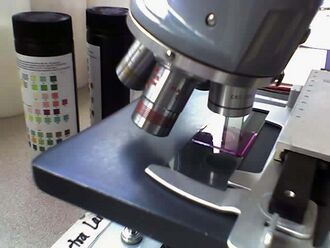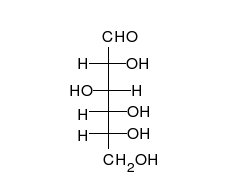Medicine:Glycogen storage disease type IX
| Glycogen storage disease IX | |
|---|---|
 | |
| Glycogen structure | |
| Symptoms | Enlarged liver[1] |
| Causes | Mutations in PHKA1, PHKA2, PHKB, or PHKG2 genes[2] |
| Diagnostic method | CBC, Urinalysis[1][3] |
| Treatment | Physical therapy, follow metabolic nutritionist[1] |
Glycogen storage disease type IX is a hereditary deficiency of glycogen phosphorylase kinase B that affects the liver and skeletal muscle tissue. It is inherited in an X-linked or autosomal recessive manner.[1]
Signs and symptoms
The signs and symptoms in glycogen storage disease type IX include:[1]
- Enlarged liver
- Slowed growth
- Motor development delay (mild)
- Low blood sugar accompanied by ketosis
- Lack of muscle tone
Most of these signs and symptoms diminish as adulthood sets in.[1]
Genetics
Glycogen storage disease type IX can be inherited via:[2][4]
- X-linked recessive inheritance due to mutations at either PHKA1 or the PHKA2 (most common[5]) gene
- Autosomal recessive could be the inheritance pattern for an affected individual when the genes PHKB or PHKG2 have a mutation.
Diagnosis
The diagnosis of glycogen storage disease IX consists of the following:[1][3]
- Complete blood count
- Urinalysis
- Histological study of the liver (via biopsy)
- Genetic testing
- Physical exam
Types
There are two types of this inherited condition, glycogen storage disease IXa1 and glycogen storage disease IXa2 that affect the liver of an individual.[6] Mutations in PHKA2 have been seen in individuals with glycogen storage disease IXa2.
Management
The management of Glycogen storage disease IX requires treatment of symptoms by frequent intake of complex carbohydrates and protein to combat the low blood sugar. A nutritionist will advise on suitable diets. Liver function is regularly monitored and problems managed as they arise. However, liver problems have only been successfully treated by a transplant. Routine checks of metabolism are needed to ensure blood sugar (glucose) and ketones are managed. Regular moderate exercise is beneficial, although over-vigorous exercise is to be avoided, especially in those with enlarged livers.[1][7]
See also
References
- ↑ 1.0 1.1 1.2 1.3 1.4 1.5 1.6 1.7 Goldstein, Jennifer; Austin, Stephanie; Kishnani, Priya; Bali, Deeksha (1993). Phosphorylase Kinase Deficiency. Seattle (WA): University of Washington. https://www.ncbi.nlm.nih.gov/books/NBK55061/. update 2011
- ↑ 2.0 2.1 "Glycogen storage disease type IX". https://ghr.nlm.nih.gov/condition/glycogen-storage-disease-type-ix#inheritance.
- ↑ 3.0 3.1 Tidy, Colin (21 August 2014). "Glycogen Storage Disorders. GSD information and treatment". Patient Platform. http://patient.info/doctor/glycogen-storage-disorders-pro. Retrieved 6 August 2016.
- ↑ "Glycogen storage disease due to phosphorylase kinase deficiency". http://www.orpha.net/consor/cgi-bin/OC_Exp.php?Expert=370.
- ↑ Bernstein, Laurie E; Rohr, Fran; Helm, Joanna R (2015-06-03). Nutrition Management of Inherited Metabolic Diseases: Lessons from Metabolic University. Springer. p. 303. ISBN 9783319146218. https://books.google.com/books?id=q1LMCQAAQBAJ&pg=PA303. Retrieved 6 August 2016.
- ↑ "Glycogen storage disease IX". Johns Hopkins University. http://www.omim.org/entry/306000.
- ↑ Fernandes, John; Saudubray, Jean-Marie; van den Berghe, Georges (2013-03-14). Inborn Metabolic Diseases: Diagnosis and Treatment. Springer Science & Business Media. p. 80. ISBN 9783662031476. https://books.google.com/books?id=97zoCAAAQBAJ&pg=PA81. Retrieved 6 August 2016.
Further reading
- Johnson, Abiodun O.; Goldstein, Jennifer L.; Bali, Deeksha (July 2012). "Glycogen Storage Disease Type IX". Journal of Pediatric Gastroenterology and Nutrition 55 (1): 90–92. doi:10.1097/MPG.0b013e31823276ea. PMID 21857251.
- Özen, Hasan (14 May 2007). "Glycogen storage diseases: New perspectives". World Journal of Gastroenterology 13 (18): 2541–2553. doi:10.3748/wjg.v13.i18.2541. ISSN 1007-9327. PMID 17552001.
- Albash, Buthainah; Imtiaz, Faiqa; Al-Zaidan, Hamad; Al-Manea, Hadeel; Banemai, Mohammed; Allam, R.; Al-Suheel, Ali; Al-Owain, Mohammed (2014). "Novel PHKG2 mutation causing GSD IX with prominent liver disease: report of three cases and review of literature". European Journal of Pediatrics 173 (5): 647–653. doi:10.1007/s00431-013-2223-0. ISSN 1432-1076. PMID 24326380.
- Stoler, edited by Raymond R. Tubbs, Mark H.; Stoler, Mark H. (2009) (in en). Cell and tissue based molecular pathology (1st ed.). Philadelphia: Churchill Livingstone/Elsevier. ISBN 978-1437719482. https://books.google.com/books?id=78Zeu0jmeYcC&q=Glycogen+storage+disease+type+IX&pg=PA290. Retrieved 6 December 2017.
External links
| Classification | |
|---|---|
| External resources |
 |



